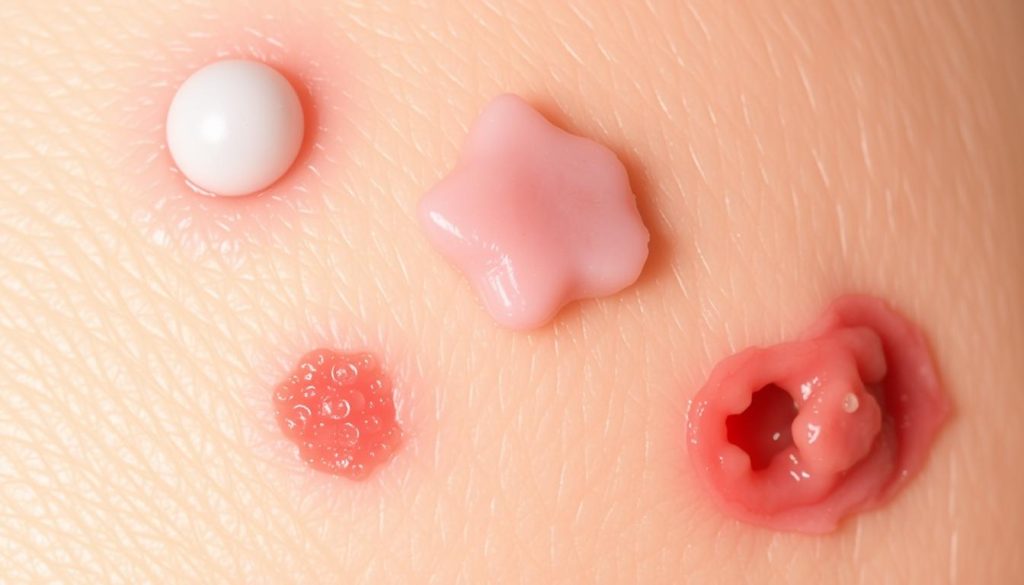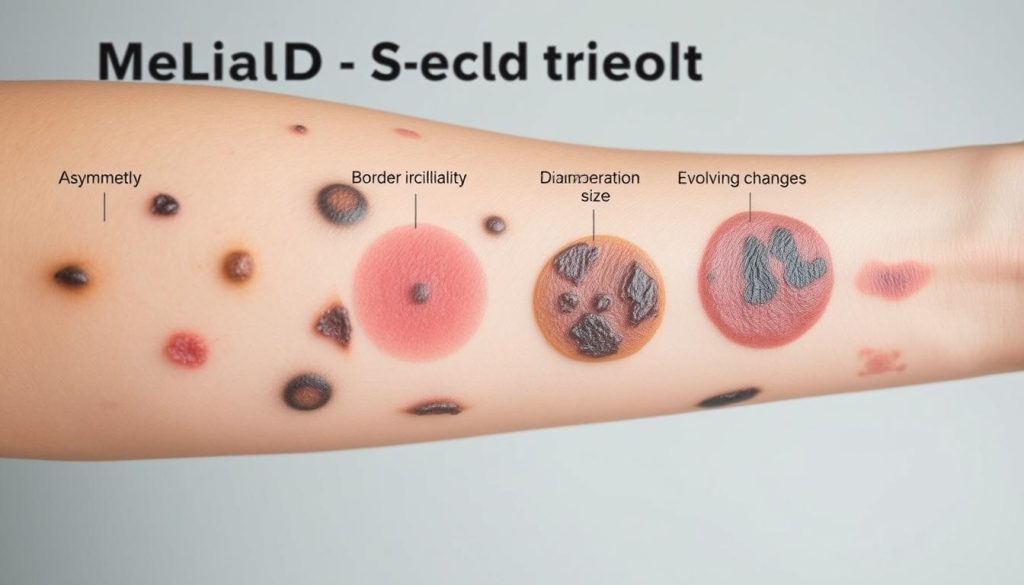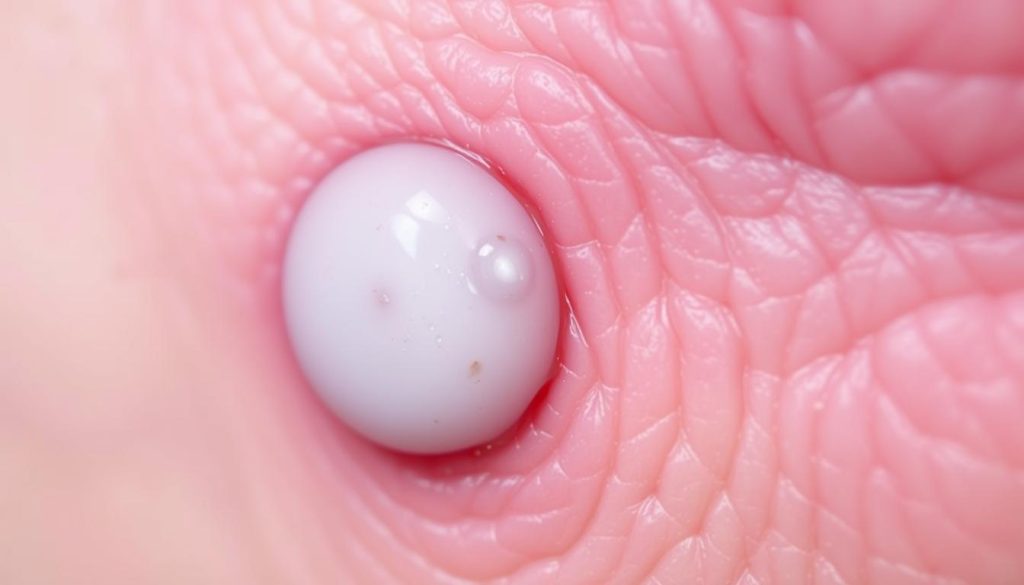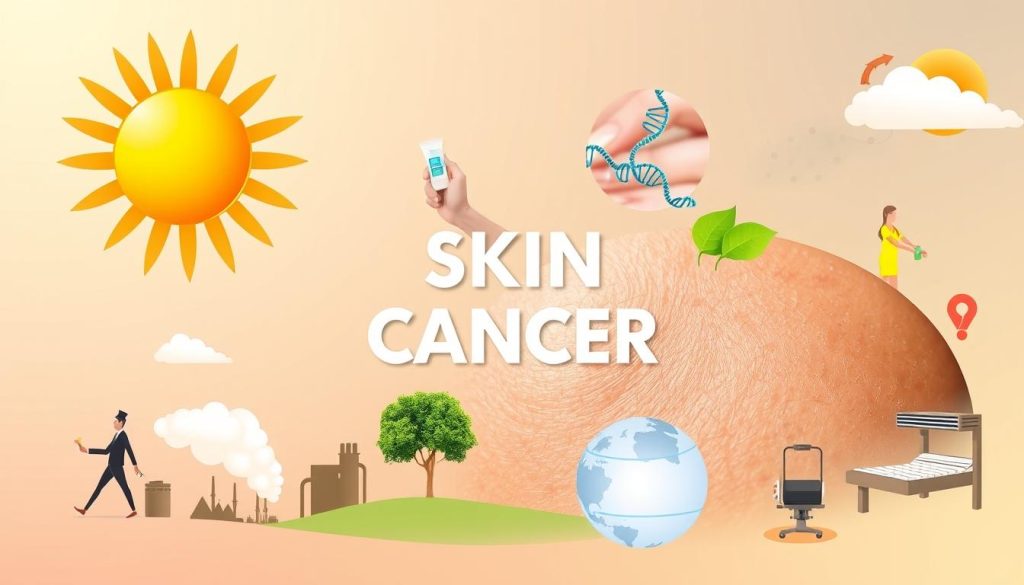Skin cancer is a serious health concern affecting millions of Americans each year. This guide delves into the various types of skin cancer and their symptoms. It empowers you with knowledge for early detection and prevention. Understanding the different forms of skin cancer is key. We’ll explore risk factors, treatment options, and the latest research. This will help you stay informed and proactive about your skin health.
By familiarizing yourself with skin cancer symptoms and types, you’re taking an important step. You’re protecting your well-being. Let’s dive into this essential topic and uncover the information you need to stay vigilant against skin cancer.
Understanding Different Types of Skin Cancer
Skin cancer has many forms, each with its own traits. It falls into two main groups: non-melanoma and melanoma. Knowing about these types is key for catching and treating skin cancer early.
Non-Melanoma vs. Melanoma Skin Cancers
Non-melanoma cancers include basal cell carcinoma and squamous cell carcinoma. These are more common and usually less serious. Melanoma, though rarer, is more dangerous because it can spread fast.
Statistics and Prevalence in the United States
Skin cancer is the top cancer in the U.S. The American Cancer Society says over 5 million cases are found each year. Basal cell carcinoma makes up about 80% of these, with squamous cell carcinoma at 20%. Melanoma, though less common, is responsible for most skin cancer deaths.
Risk Factors and Common Causes
Many things can raise your risk of getting skin cancer:
- UV exposure from sunlight or tanning beds
- Fair skin that burns easily
- History of sunburns
- Family history of skin cancer
- Weakened immune system
- Exposure to certain chemicals
Knowing these risk factors helps in preventing and catching skin cancer early. This includes melanoma, basal cell carcinoma, and squamous cell carcinoma.
Basal Cell Carcinoma: The Most Common Form
Basal cell carcinoma (BCC) is the most common skin cancer. It grows in the basal cells, which are in the lower part of the skin. Knowing about BCC helps catch it early and treat it well.
Identifying Basal Cell Carcinoma
Spotting skin cancer signs is vital for early detection. BCC can look like:
- A pearly or waxy bump
- A flat, flesh-colored or brown scar-like lesion
- A bleeding or scabbing sore that heals and returns

Common Areas of Development
BCC usually shows up on sun-exposed parts of the body. Common spots include:
- Face, specially the nose
- Ears
- Neck
- Scalp
- Shoulders and chest
Treatment Options for BCC
Treatment for BCC depends on the tumor’s size, location, and depth. Common treatments are:
- Surgical excision
- Mohs surgery
- Radiation therapy
- Topical medications
- Photodynamic therapy
Early detection and quick treatment of BCC improve outcomes. Regular skin checks and sun protection help prevent this common skin cancer.
Squamous Cell Carcinoma: Signs and Development
Squamous cell carcinoma (SCC) is a common skin cancer. It grows in the squamous cells of the skin’s upper layers. Knowing the signs and how SCC develops is key for catching it early.
SCC often begins as actinic keratosis, a precancerous lesion. These patches are rough and scaly. They can turn into SCC if not treated. This usually happens in sun-exposed areas like the face, ears, and hands.
Spotting skin cancer symptoms early is critical. Look out for:
- A firm, red nodule
- A flat lesion with a scaly, crusted surface
- A new sore or raised area on an old scar or ulcer
- A rough, scaly patch on the lip that may evolve to an open sore
SCC is more likely to spread than basal cell carcinoma if not treated quickly. This makes catching it early very important for a good outcome.
| Feature | Squamous Cell Carcinoma | Actinic Keratosis |
|---|---|---|
| Appearance | Firm, red nodule or flat lesion with scaly surface | Rough, scaly patch |
| Texture | Can be smooth, scaly, or crusted | Rough and scaly |
| Color | Red, pink, or brown | Pink, red, or brown |
| Size | Varies, can grow larger over time | Usually smaller than 1 inch |
| Risk of spread | Can metastasize if left untreated | No risk of spread (precancerous) |
If you see anything odd on your skin, see a dermatologist right away. Catching SCC early can greatly improve your chances of a full recovery.
Melanoma: The Most Dangerous Type
Melanoma is the most aggressive form of skin cancer. It’s a life-threatening condition that needs early detection and treatment. Knowing its signs can greatly improve patient outcomes.
ABCDE Rule for Melanoma Detection
The ABCDE rule is a key tool for spotting melanomas. It’s an easy guide to help find skin cancer symptoms early:
- A – Asymmetry
- B – Border irregularity
- C – Color variations
- D – Diameter larger than 6mm
- E – Evolving size, shape, or color

Types of Melanoma
Melanoma comes in several forms, each with its own traits:
| Type | Description | Location |
|---|---|---|
| Superficial Spreading | Most common, grows outward on skin surface | Trunk, limbs |
| Nodular | Grows downward, aggressive | Any body part |
| Lentigo Maligna | Slow-growing, sun-damaged skin | Face, neck, arms |
| Acral Lentiginous | Occurs in people with darker skin | Palms, soles, nails |
Staging and Prognosis
Melanoma staging is key for treatment and survival rates. Stages range from 0 to IV, with stage 0 being the earliest and stage IV the most advanced. Early-stage melanomas have high survival rates, showing the need for regular skin checks and quick medical attention for any suspicious changes.
Early Warning Signs and Symptoms
Spotting skin cancer early can save lives. Each type of skin cancer shows different signs. It’s key to check your skin regularly.
Basal cell carcinoma might look like pearly or waxy bumps. You might see flat, flesh-colored spots or brown scars. Squamous cell carcinoma shows up as firm, red bumps or flat spots with scales.
Melanoma, the most serious type, has clear signs:
- Asymmetry: One half doesn’t match the other
- Border: Irregular, jagged edges
- Color: Varied shades of brown, black, or tan
- Diameter: Larger than 6 millimeters
- Evolution: Changes in size, shape, or color over time
Watch for new growths, changes in moles, or sores that won’t heal. If you see these signs, see a dermatologist right away.
| Type of Skin Cancer | Common Symptoms | Areas Most Affected |
|---|---|---|
| Basal Cell Carcinoma | Pearly bumps, flat lesions, brown scars | Face, ears, neck |
| Squamous Cell Carcinoma | Firm red nodules, scaly lesions | Face, hands, arms |
| Melanoma | Irregular moles, dark spots | Trunk, legs, anywhere on body |
Early detection is key to better treatment. Do monthly self-exams and get annual skin checks. This helps fight skin cancer.
Merkel Cell Carcinoma: A Rare but Aggressive Form
Merkel cell carcinoma is a rare skin cancer that can grow quickly if not treated. It happens when Merkel cells in the skin start to grow too much. It’s important to know about its risks and treatment options.

Risk Factors for MCC
Several factors can make you more likely to get Merkel cell carcinoma:
- Age over 50
- Fair skin
- Too much sun exposure
- Weakened immune system
- History of other skin cancers
Treatment Approaches
Treatment for Merkel cell carcinoma depends on the cancer’s stage and where it is. Common treatments include:
| Treatment | Description | Effectiveness |
|---|---|---|
| Surgery | Removing the tumor and nearby tissue | High for early tumors |
| Radiation | High-energy beams to kill cancer cells | Works well as extra therapy |
| Immunotherapy | Boosts the body’s immune fight against cancer | Promising for later stages |
Early detection and quick treatment are vital for better outcomes with Merkel cell carcinoma. Regular skin checks and protecting your skin from the sun can lower the risk of this and other skin cancers.
Diagnosis and Screening Methods
Finding skin cancer early is key to treating it well. Doctors use many ways to spot different skin cancers and their symptoms. Let’s look at the common methods doctors use.
Skin Examination Process
The first thing doctors do is a detailed skin check. A dermatologist looks over your skin from top to bottom. They search for any odd moles, growths, or color changes.
They might use a special tool called a dermatoscope to examine close-up. This helps them see better in tricky spots.
Biopsy Types and Procedures
If something looks off, a biopsy might be needed. There are a few types of biopsies for skin cancer:
- Shave biopsy: The doctor shaves off the top layers of skin
- Punch biopsy: A small, round piece of skin is removed
- Excisional biopsy: The whole growth is cut out
After the biopsy, a pathologist checks the tissue under a microscope. They look for cancer cells and figure out the cancer type. This helps decide the best treatment and how far the cancer has spread.
Treatment Options and Modern Approaches
Skin cancer treatment has made great strides, giving hope to those affected. The treatment plan depends on the cancer type, stage, and the patient’s needs.
Surgery is a key part of treating skin cancer. For cancers caught early, doctors might suggest simple excision or Mohs surgery. These methods aim to remove the cancer while keeping healthy skin intact.
Radiation therapy is another choice for those who can’t have surgery. It uses high-energy rays to kill cancer cells. This method works well for some skin cancers, like those in sensitive areas like the face.
Chemotherapy and immunotherapy have changed the game for treating skin cancer, mainly for advanced cases. These treatments target cancer cells throughout the body. Immunotherapy, in particular, has shown great promise for melanoma patients.
| Treatment Type | Best For | Side Effects |
|---|---|---|
| Surgery | Localized skin cancers | Scarring, infection risk |
| Radiation | Sensitive areas, elderly patients | Skin irritation, fatigue |
| Chemotherapy | Advanced skin cancers | Nausea, hair loss |
| Immunotherapy | Advanced melanoma | Flu-like symptoms, rash |
Doctors often mix these treatments for the best results. They aim to get rid of the cancer with minimal side effects. As research continues, new targeted therapies are on the horizon, promising even better treatments for skin cancer.
Prevention Strategies and Sun Protection
Preventing skin cancer is key to keeping your skin healthy. It also lowers your risk of getting different types of skin cancer. By following these tips, you can shield yourself from harmful UV rays and lessen skin damage.
Sunscreen Guidelines
Use a broad-spectrum sunscreen with SPF 30 or higher every day. Reapply it every two hours or after swimming or sweating. Don’t forget to cover often-missed spots like ears, neck, and feet.
Protective Clothing
Wear clothes that protect you from the sun when you’re outside. This includes wide-brimmed hats, long-sleeved shirts, and sunglasses with UV protection. Choose clothes with a high UPF rating for better protection against UV rays.
Lifestyle Modifications
Make a few simple changes to cut down on sun exposure. Stay in the shade when the sun is strongest (10 am to 4 pm). Stay away from tanning beds, as they raise your skin cancer risk. Regular skin checks can help catch early signs of skin cancer.
- Use a broad-spectrum sunscreen daily
- Wear protective clothing outdoors
- Seek shade during peak sun hours
- Avoid tanning beds
- Perform regular skin self-exams
By adding these skin cancer prevention steps to your daily life, you can greatly lower your risk of skin cancer. You’ll also keep your skin looking healthy and beautiful.
Risk Factors and Genetic Predisposition

Knowing your risk factors is key to preventing skin cancer. While anyone can get skin cancer, some factors up your risk. By understanding these, you can protect your skin better.
Your skin type affects your risk. If you have fair skin, light eyes, and blonde or red hair, you’re more at risk. This is because UV rays harm your skin more, leading to skin cancer.
Genetics also play a big role. If your family has a history of skin cancer, you’re at higher risk. Some inherited conditions, like xeroderma pigmentosum, also up your risk.
Environmental factors also matter a lot. Too much sun, sunburns, and using tanning beds increase your risk. These can lead to skin cancer later on.
Other risk factors include:
- A weakened immune system
- Previous skin cancer diagnosis
- Exposure to certain chemicals, like arsenic
- Radiation therapy
Having risk factors doesn’t mean you’ll definitely get skin cancer. Regular skin checks and sun protection are vital. They help everyone, no matter their risk level.
Living with Skin Cancer: Support and Care
Getting a skin cancer diagnosis can feel overwhelming. It’s important to take care of both your body and mind during treatment and recovery. Having a support system and making lifestyle changes can help manage the challenges of living with skin cancer.
Mental Health Support
Dealing with skin cancer can be tough on your emotions. Many people feel anxious, depressed, or worried about it coming back. Getting help from professionals or joining support groups can offer emotional support. Counseling can teach you how to handle stress and stay strong during treatment.
Lifestyle Adjustments
Living with skin cancer means making some lifestyle changes. These changes help with healing and stopping it from coming back. They are key for treatment and prevention:
- Sun protection: Wear broad-spectrum sunscreen daily and protective clothing when outdoors
- Diet: Increase intake of antioxidant-rich foods to support skin health
- Exercise: Regular physical activity can boost mood and overall well-being
- Skin checks: Perform monthly self-exams and schedule regular dermatologist visits
By making these changes and getting support, you can better handle life with skin cancer. Remember, you’re not alone. Talk to healthcare providers, loved ones, or support groups for help and encouragement during your treatment.
Recovery and Follow-up Care
After skin cancer treatment, recovery and ongoing care are key to staying healthy. Patients must follow certain guidelines to heal properly and lower the chance of cancer coming back.

Post-treatment care means gentle skin cleaning and avoiding the sun. Use mild, fragrance-free soap and apply broad-spectrum sunscreen every day. Wearing protective clothes, like wide-brimmed hats and long-sleeved shirts, also helps in preventing skin cancer.
Regular check-ups are vital for watching your recovery and catching any problems early. How often you need to go depends on your skin cancer type and stage. Here’s a common follow-up schedule:
| Time After Treatment | Frequency of Check-ups |
|---|---|
| First Year | Every 3-4 months |
| Second Year | Every 6 months |
| Third Year and Beyond | Annually |
At these visits, doctors do detailed skin checks and might suggest more treatment if needed. It’s also important to do monthly self-exams at home for new or changing skin spots.
For long-term prevention, live a healthy lifestyle, avoid tanning beds, and keep up with new skin cancer treatments. By doing these things, patients can greatly improve their long-term health.
Latest Research and Treatment Innovations
The world of skin cancer treatment is changing fast, bringing new hope to patients. Researchers are working hard to create new therapies. These aim to target different types of skin cancer more effectively.
Immunotherapy Advances
Immunotherapy is a big step forward in treating skin cancer. It uses the body’s immune system to attack cancer cells. For melanoma, drugs like pembrolizumab and nivolumab have shown great promise. They have helped many patients live longer.
Targeted Therapies
Targeted therapies are also making a big impact. These treatments focus on specific genetic mutations in cancer cells. For example, BRAF inhibitors have been very effective against some melanomas. They offer new hope for patients with advanced disease.
As research keeps going, the future of skin cancer treatment looks very promising. We’re seeing improvements in early detection and personalized treatment plans. These advances are leading to better outcomes and a better quality of life for those with skin cancer.
FAQ
Q: What are the main types of skin cancer?
A: There are two main types of skin cancer: non-melanoma and melanoma. Non-melanoma includes basal cell carcinoma (BCC) and squamous cell carcinoma (SCC). Melanoma is less common but more dangerous. Merkel cell carcinoma (MCC) is another rare type.
Q: How can I identify potentially cancerous skin symptoms?
A: Watch for new growths, changes in moles, or sores that don’t heal. For melanoma, use the ABCDE rule: Asymmetry, Border irregularity, Color changes, Diameter larger than 6mm, and Evolving size, shape, or color. Any suspicious changes need a dermatologist’s check.
Q: What are the risk factors for developing skin cancer?
A: Risk factors include UV exposure, fair skin, sunburn history, and many moles. Family history, weakened immune system, and certain genetic conditions also increase risk. Age and chemical exposure can play a role too.
Q: How is skin cancer diagnosed?
A: Diagnosis involves a visual check and biopsy. A dermatologist will look at suspicious areas and might take a biopsy. This involves removing a small tissue sample for microscopic examination.
Q: What treatment options are available for skin cancer?
A: Treatment varies by cancer type, size, location, and stage. Options include surgery, radiation, chemotherapy, and more. Your doctor will choose the best treatment for you.
Q: How can I prevent skin cancer?
A: Prevent skin cancer by using sunscreen daily, wearing protective clothing, and staying in the shade. Avoid tanning beds, do regular skin self-exams, and get annual dermatologist checks.
Q: What is the survival rate for skin cancer?
A: Survival rates vary by cancer type and stage. Non-melanoma cancers have high cure rates when caught early. Melanoma survival rates depend on the stage, ranging from over 90% for early stages to less than 30% for advanced stages.
Q: Can skin cancer spread to other parts of the body?
A: Yes, skin cancer can spread, more often with melanoma and advanced SCC. BCC rarely spreads. Early detection and treatment reduce metastasis risk.
Q: What is actinic keratosis and how is it related to skin cancer?
A: Actinic keratosis is a sun damage-caused skin condition. It shows as rough, scaly patches and can turn into SCC if untreated. Treating actinic keratosis early can prevent skin cancer.
Q: Are there any new treatments or research breakthroughs for skin cancer?
A: New treatments include improved immunotherapy for melanoma, targeted therapies, and combination therapies. Research focuses on personalized medicine and new drug development.

















